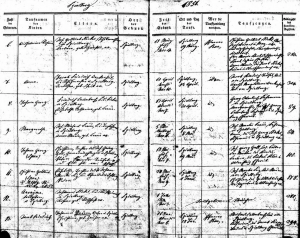It happens to the best of us. No matter how confident we are reading a church record, there is bound to be a word or two (or ten?!) that trips us up – and that we can’t figure out for the life of us. So what can we do when that happens? Below, read the seven tips I have gathered from my years of experience of getting stumped!

1. Translate the Column Heading.
While it may seem like extra work when you just want to know what is in your own ancestor’s column, translating the column heading can be extremely helpful. This information, after all, will tell you exactly what to expect in the column. You may see a heading such as “How the Deceased Passed Away and Whether This was Confirmed by a Coroner.” When reading that, you now know what type of words you can expect to find in your own entry – whereas before you would have gone in blind. It really makes all the difference, I promise.
2. Look at the entries above and below.
This is something I say time and again, but that is because it is true. Church records were often written in the same format from record to record, so if you can’t decipher a word on your own record, look in that exact spot in the entry above or below. Can you read the word there? If so, what type of word is it? An occupation? A town? A relationship? Chances are, it’s the same type of word in your own record as well. And knowing what type of word you are reading makes deciphering it much easier.
3. Google Word Lists.
Once you confirm that you word is a certain category – a town, an occupation, a name, a relationship, an illness, etc. – you can google lists of those German words – “Illnesses in German”, “Old-fashioned occupations in German”, etc. Then, you can scan those lists, and see if your word appears on them. Oftentimes, if you see it on a list, it helps your mind to recognize those mystery words!
4. Search for additional instances of mystery letters.
Still stumped? Write down the letters in your word you recognize, and leave blanks for the letters you don’t. Put your letters into the fill-in-the-blank site of Wordmine.info, and see if that site offers any suggestions for what the entire word could be. If not, it’s time to go on to the next trick – scanning the other records for any similar-shaped letters.
Do any other words have those mystery letters in them? If so, even if you can’t read that mystery letter, is that word more obvious about what it is? Maybe it is Bauer, the common occupation of farmer, and you can read “B-a-u-e”. That mystery letter on the end must be an “r”, meaning that it would be an “r” in your mystery word as well!
5. Page Through the Book.
If you still are having problems – which, no worries if so, I have been there – then it’s time to put the whole church record book to use. If possible, start looking at other pages as well (as opposed to just the entries above or below). Maybe your mystery letter is rare – like an x – and it won’t appear for another 10 pages or so. But luckily most sites allow you to flip through the entire church book, so keep looking until you find that letter or word!
6. Google the Phrase in Quotes.
This is a great trick, and has saved me many a time. If you can’t read a word, but can read the words before it, google them in quotes. Google might just fill in the blank for you. For example, you may see the phrase “mit den heiligen Sakramenten” but not be able to read that last word. If you google that phrase in quotes, you should see entries pop up with “mit den heiligen Sakramenten versehen”. You could then look at your word, and think, “Ohhhh! That word is versehen!” Letting Google fill in the blank for you – whether through topic-appropriate articles, genealogy forums with similar questions posted, or something else – is very helpful. (“mit den heiligen Sakramenten versehen” means “received the last rites”).
7. Take a Break.
Finally, if you are still having trouble – take a break for a few hours. Or maybe even a few days! Sometimes we can get stuck in our own heads, and coming back to a word with a fresh brain and a fresh pair of eyes is often all you need to solve your puzzle. Best of luck!
